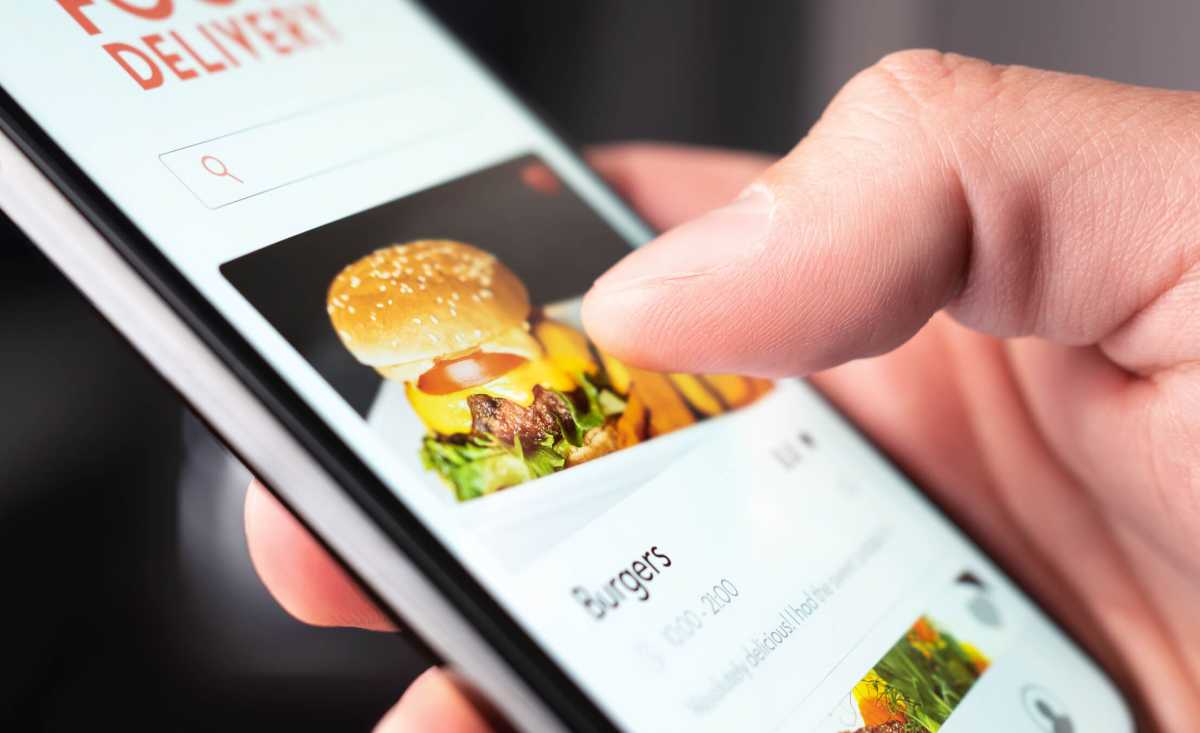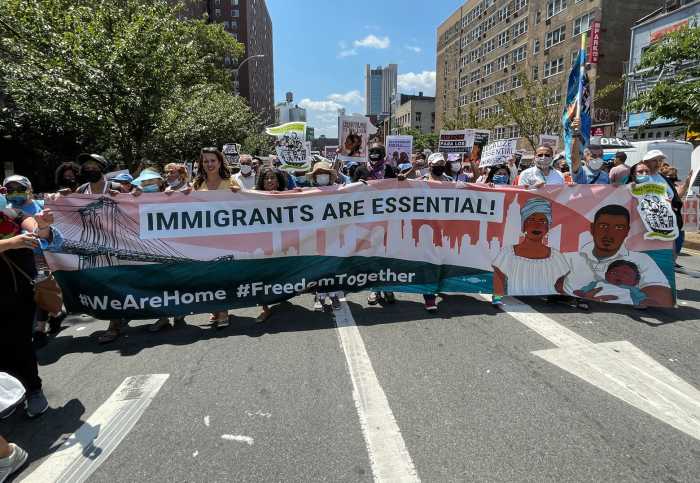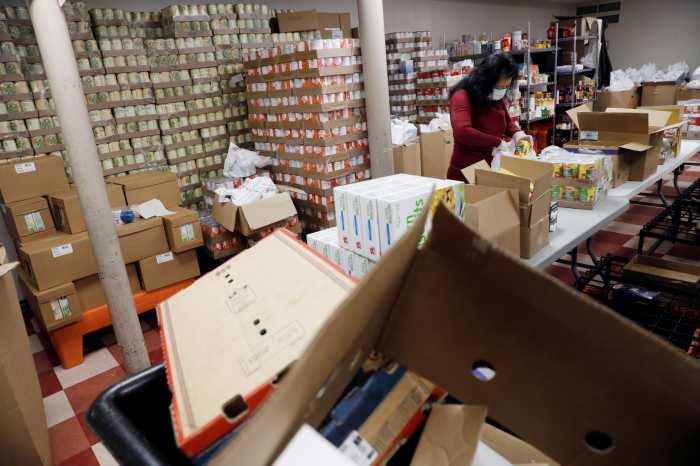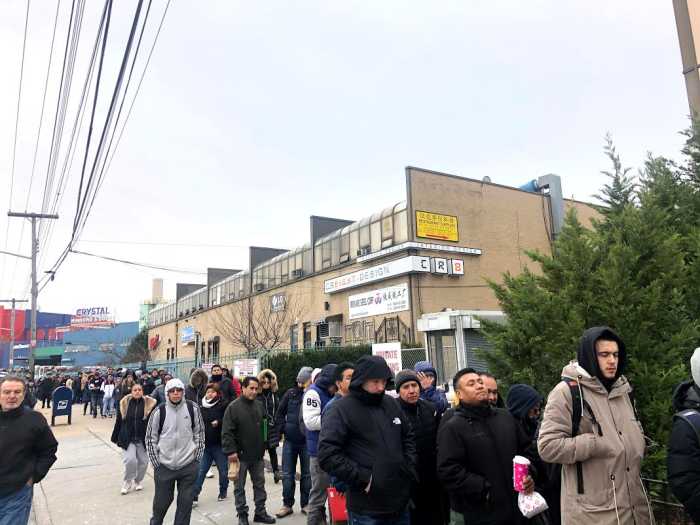Gustavo Ajche made the difficult decision to immigrate to New York City nearly 20 years ago. Like countless others before him, Gustavo came to New York City with the dream of securing a good-paying job and building a better life for his wife and two children, who stayed behind in Guatemala.
Within days of arriving in the city, Gustavo used what little money he had to buy a bicycle and started delivering pizzas on the Upper West Side, making just enough in tips to pay for his children’s education back home.
Nearly twenty years later, the industry has been transformed by app companies like Uber Eats, DoorDash and GrubHub. Yet, Gustavo still relies on tips to get by while delivering food through hurricanes, wildfire smoke and a pandemic so New Yorkers can stay home.
During the pandemic, Gustavo organized Los Deliveristas Unidos, the group representing New York City’s more than 65,000 delivery workers, almost all of whom are immigrants, to fight for better pay and basic protections. In June, the deliveristas made history when they secured the country’s first minimum pay rate for app-based food delivery workers after a hard-fought three-year campaign.
Yet, days before the minimum pay rate was supposed to go into effect, multi-billion dollar apps – the companies now required to pay workers a decent wage – continued their campaign to reverse this historic step forward for immigrant workers. On July 6, less than a week before the pay rate was supposed to go into effect, the apps successfully delayed this desperately needed raise for countless immigrant families.
Today, thousands of immigrant workers like Gustavo are still waiting for the same basic, fundamental right nearly every worker in our city enjoys: a minimum pay rate.
The multi-billion dollar app companies holding back immigrant workers need to understand one thing: Just because we have the tenacity to take on some of the most demanding – but essential – physical work doesn’t mean we should have to live with injustice.
Just like Gustavo, millions of immigrants have embarked on the same perilous journey to this country to pursue the American dream. They are the backbone of our city’s economy. More than a third of New York City’s population and 43% of the workforce are immigrants.
Every day, New Yorkers rely on the hard work of immigrants in nearly every aspect of their lives, and the pandemic showed us just how essential New York City’s deliveristas are. In just three months in 2021, delivery workers across the five boroughs fulfilled over 30 million orders placed through apps.
When New York City went into lockdown, delivery workers didn’t just keep New Yorkers fed – they kept the restaurant industry afloat, helping thousands of small businesses keep on the lights. But deliveristas struggled to make ends meet while giant corporations raked in billions and forced workers to travel further distances to keep up with the surge in demand.
Despite risking their lives every day on the job, delivery workers on average only make around $11 an hour after tips – several dollars below the state’s minimum wage. They brave unpredictable weather and dangerous traffic. They also have to pay for their own equipment and healthcare because they’re not legally classified as employees, all while navigating language barriers, housing insecurity and trying to make just enough for themselves and their families back in their home countries.
As the children of immigrants, we know firsthand the challenges immigrants disproportionately face after arriving in our city with hopes for a better life. Although the new state minimum wage will go into effect Jan.1, New York’s minimum wage efforts are not over until every worker in New York earns a wage that allows them to pay their bills and save for a rainy day.
New York has always been home to immigrants who have escaped the injustices in their home countries, working gig job after gig job to support their families. We’re proud New York City is standing alongside deliveristas, taking action to undo the decades of systemic discrimination against an essential community and protect those who took care of us during one of our city’s darkest times.
New York is on the right side of history by fighting for the minimum pay rate delivery workers deserve and setting a strong example for how our country should recognize the essential work of immigrants.
The app companies are the only thing standing in the way.
City Councilmember Oswald Feliz represents the 15th Council District – which includes the neighborhoods of Fordham, Belmont, East Tremont, West Farms Van Nest and Allerton. A lifelong resident of the Bronx, Councilmember Feliz is the son of a taxi driver and was previously a lawyer who defended low-income families at risk of losing their homes.
Senator Jessica Ramos represents the neighborhoods of Jackson Heights, Corona, Elmhurst, East Elmhurst, and a sliver of Rego Park. As chair of the Senate Committee on Labor, Senator Ramos has championed labor rights for farm and domestic workers, a landmark $2.1 billion Excluded Workers Fund, and record investments in child care and worker safety.





































